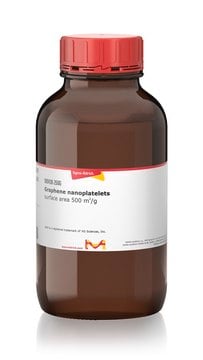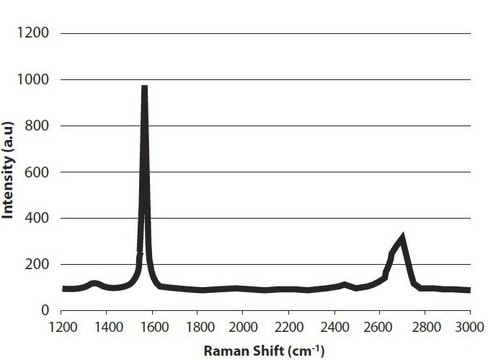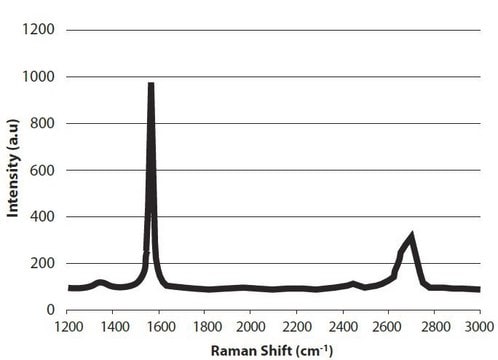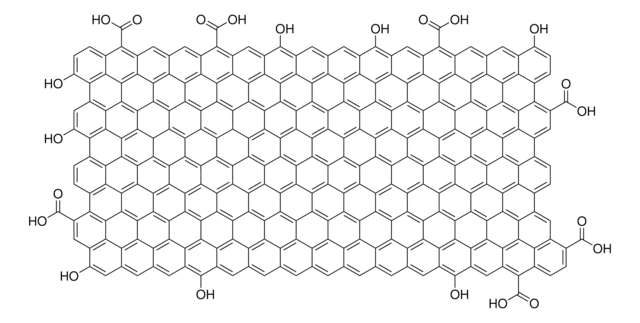900412
Graphene nanoplatelets
5 μm particle size
Synonyme(s) :
xGnP M-5
Se connecterpour consulter vos tarifs contractuels et ceux de votre entreprise/organisme
About This Item
Formule empirique (notation de Hill):
C
Numéro CAS:
Poids moléculaire :
12.01
Numéro CE :
Numéro MDL:
Code UNSPSC :
12141908
Nomenclature NACRES :
NA.23
Produits recommandés
Description
residual acid content: <0.5 wt%
Niveau de qualité
Forme
powder
Composition
oxygen content, <1%
Superficie
120-150 m2/g
Épaisseur
6-8 nm , average
Taille des particules
5 μm
Masse volumique apparente
0.03‑0.1 g/cm3
Chaîne SMILES
[C]
InChI
1S/C
Clé InChI
OKTJSMMVPCPJKN-UHFFFAOYSA-N
Vous recherchez des produits similaires ? Visite Guide de comparaison des produits
Description générale
xGnP® graphene nanoplatelets are unique nanoparticles consisting of short stacks of graphene sheets having a platelet shape. The unique size and platelet morphology of xGnP® graphene nanoplatelets makes these particles especially effective at providing barrier properties, while their pure graphitic composition makes them excellent electrical and thermal conductors. xGnP® graphene nanoplatelets can improve mechanical properties such as stiffness, strength, and surface hardness of the matrix material. xGnP® graphene nanoplatelets are compatible with almost all polymers, and can be an active ingredient in inks or coatings as well as an excellent additive to platics of all types. The unique manufacturing processes are non-oxidizing, so material has a pristine graphitic surface of sp2 carbon molecules that makes it especially suitable for applications requiring high electrical or thermal conductivity. Grade M particles have an average thickness of approximately 6-8 nanometers and a typical surface area of 120 to 150 m2/g. Grade M is available with average particle diameters of 5, 15 or 25 microns.
Note: Graphene nanoplatelets have naturally occurring functional groups like ethers, carboxyls, or hydroxyls that can react with atmospheric humidity to form acids or other compounds. These functional groups are present on the edges of the particles and their wt% varies with particle size.
Note: Graphene nanoplatelets have naturally occurring functional groups like ethers, carboxyls, or hydroxyls that can react with atmospheric humidity to form acids or other compounds. These functional groups are present on the edges of the particles and their wt% varies with particle size.
Application
- Ultracapacitor electrodes
- Anode materials for lithium-ion batteries
- Conductive additive for battery electrodes
- Electrically conductive inks
- Thermally conductive films and coatings
- Additive for lightweight composites
- Films or coatings for EMI shielding
- Substrate for chemical and biochemical sensors
- Barrier material for packaging
- Additive for super-strong concrete
- Additive for metal-matrix composites
Informations légales
xGnP is a registered trademark of XG Sciences, Inc.
Code de la classe de stockage
11 - Combustible Solids
Classe de danger pour l'eau (WGK)
WGK 1
Point d'éclair (°F)
Not applicable
Point d'éclair (°C)
Not applicable
Faites votre choix parmi les versions les plus récentes :
Déjà en possession de ce produit ?
Retrouvez la documentation relative aux produits que vous avez récemment achetés dans la Bibliothèque de documents.
Performance dependence of thermosyphon on the functionalization approaches: An experimental study on thermo-physical properties of graphene nanoplatelet-based water nanofluids.
Amiri A, et al.
Energy Conversion and Management , 92, 322-330 (2015)
Mechanical properties of graphene nanoplatelet/epoxy composites.
King JA, et al.
Journal of Composite Materials, 49(6), 659-668 (2015)
Notre équipe de scientifiques dispose d'une expérience dans tous les secteurs de la recherche, notamment en sciences de la vie, science des matériaux, synthèse chimique, chromatographie, analyse et dans de nombreux autres domaines..
Contacter notre Service technique








